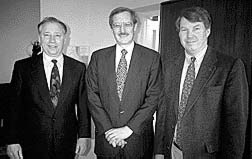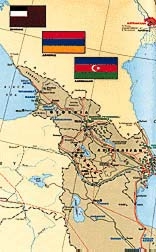|
Summer 1996 (4.2) Diplomatic Interview A Conversation with
the Three
US Ambassadors to the Caucasus
To fully understand the development
and transitional process in Azerbaijan, it's important to see
this Republic in the context of other former Soviet Republics
especially those in the Caucasus, which are struggling with similar
issues. For centuries, the Caucasus has been known for the tremendous exchange that has taken place between the people of this region. There's been incredible interaction for centuries in the spheres of culture, business and interpersonal relations. Let me first ask about the rationale for your getting together as the Representatives of the United States to the Caucasus? Kauzlarich: Let me provide some background since
I've been in my position here a bit longer than the others. This
is not an idea that originated with us. Our predecessors had
met before. In October 1994, Kent Brown (Georgia), Harry Gilmore
(Armenia) and I got together in Tbilisi to travel together for
five days throughout western Georgia for the exact reason that
you have pointed out. So this is the first time you've ever met? Kauzlarich: We've known each other from long ago. But it's the first time we've met in the context of our current responsibilities. What similarities do you see between these three countries in regard to your task of representing the United States? And what are some of the differences? Courtney: The
most striking similarity between them, obviously, is that they
were all part of the Soviet Union. Therefore, the obstacles that
they have to overcome are similar especially in regard to democratic
and economic reform. Is that still true - even though life is very difficult economically? I've heard people in Azerbaijan suggest that many individuals over 35 years of age have a tendency to reminisce and romanticize about the "good old days" under the Soviet system. I don't know if that's really true or not. Are you finding that people are still mostly excited about independence? Tomsen: As
you know, each of the Caucasus Republics had their own independent
governments during the period between 1918-21. They've all had
a taste of independence in their past. Let me ask you about U.S. aid to the region. Since both the governments of Armenia and Georgia are recipients of US aid while the Azerbaijani government has been the only one of the 15 former Soviet Republics to be denied assistance (because of U.S. Congressional Legislature, "The Freedom Support Act," Section 907), I was wondering, in terms of economic reform and democracy-building processes, whether you felt that the aid to the governmental agencies .had made a significant difference in these countries, especially in comparison to Azerbaijan's experience. Courtney: During
the first couple of years after the collapse of the USSR, most
of the U.S. aid to Georgia was humanitarian assistance in the
form of grain and fuel oil for heating. Now, the economy is beginning
to turn around. Probably next year will be the last for them
to receive large amounts of humanitarian assistance. Armenia
is leading the way in land reform but Georgia is now catching
up as they got off to a late start with economic reforms because
of civil conflict. But since then, they've made major advances
in the last year and a half or so. Georgia is on the Internet, then? Courtney: Yes.
Parliament has its own Home Page. USAID and USIS working together
have provided access to the Internet. The way forward for economic
reform is clear. Georgia had hyperinflation the first nine months
of 1994. The average monthly inflation was 65%. Georgia has since
controlled inflation through strict monetary and fiscal policy.
The IMF (International Monetary Fund) says Georgia killed hyperinflation
faster than any other country in the NIS (Newly Independent States).
Georgia has a new currency called the "Lari" which
has been stable since it was introduced in October 1995. Before we move on to other topics, let me ask you how much US aid has been directed to Georgia since independence [1991]? Courtney: Counting humanitarian assistance, the value of grain, fuel oil and technical assistance would be on the order of $100 million a year. In terms of the last election in Georgia, in what ways was the U.S. government able to strengthen the democratic processes? Courtney: Well,
by discussions with political leaders in Georgia and by publicly
supporting free and fair elections. The United States very strongly
encouraged the elections to take place. President Shevardnadze
himself was committed to free and fair elections. More importantly,
a broad range of the Georgian population seemed to understand
that "free and fair elections" was the right way to
strengthen their statehood. The elections were relatively free
and fair in most areas of Georgia. Consequently, the legitimacy
of Georgia as a State has been enhanced, as has the legitimacy
of the Parliament and Shevardnadze's Presidency. How is US aid being used in Armenia? They're receiving quite a lot of assistance, aren't they, especially given their relatively small population (2+ million)? Tomsen: Yes. For example, this year, if you include all sources-the Department of Agriculture, the Treasury, USAID, and the State Department. Together it would add up to about $143 million. Well over 50% goes to humanitarian assistance. Specifically, who is receiving it? Tomsen: The
Republic of Armenia has blockades on both sides-Turkey to the
West and Azerbaijan to the East. But to the north, there are
trade routes into Georgia and to the south, into Iran. But there
is really not much activity yet in terms of exports and imports.
Armenia has always been a fairly industrialized country with
less emphasis on agriculture (70 percent industry, 30 percent
agriculture). So the U.S. has supplied a large amount of grain
to Armenia. That means Parliament has ratified it? Tomsen: Yes,
it's a law now. Land and property will be measured and titles
designated for the owners, enabling property to be bought and
sold. A free market economy requires privatization if it is to
move forward.
Tomsen: No, basically not. Armenia's computer technology is outmoded. But Armenians are very skilled in this area. If we manage to get investment from abroad, then Armenia could compete quite well in the international market especially since wages are so low (less than $100 a month). Let me ask you, in general, about the U.S. aid that is going to Armenia for fuel and grain. Is such aid being monitored by the United States? How do you guarantee that fuel and grain are not being used by Armenians in the war effort against Azerbaijan? How do you guarantee that U.S. taxpayer's money isn't fueling the war? Tomsen: U.S. assistance is directed to the Armenia government. The wheat, for example, comes in via train through Georgia and is taken to the government's three flour mills. Then it gets distributed to the bakeries and transported to about 300 outlets around the country where it is sold at very nominal prices.
Tomsen: We
see no evidence that wheat or any other aid is being divested.
If all this activity is generated between Azerbaijan and Georgia, will Armenia be left out? Kauzlarich: No,
I don't think so. Not at all. To me, the benefit, even in Azerbaijan,
will come from the secondary and tertiary economic development
that is going to take place because of the oil. When new communication
links are established and new improved infrastructure exists
for ports, you're going to see Armenia having an easier time
receiving goods and linking into transportation and communication
systems. In what ways? Tomsen: Various
ways. We're providing training on how to run a business for many
of the TV stations that are springing up. We're also providing
them with equipment and training. We're helping the Yerevan Press
Club to get established as a professional independent entity.
We're involved in helping establish a legal infrastructure. We've
started a Master of Law Program at the American University which
is connected with the University of California. We're helping
Yerevan State University with its law program and providing a
lot of technical assistance in drafting laws that are reflective
of due process, democracy and market economy. The head of the
Armenian Constitutional Court will be visiting the U.S. Supreme
Court in May and traveling around the country. For example? Kauzlarich: ISAR is one (an environmental NGO) and Inter-News. The NDI (National Democratic Institute) now has offices in all three countries, I believe. Essentially, we're pursuing the same kinds of programs as the other countries of the Caucasus are. It's easy to look at "907" and think there's no assistance coming to Azerbaijan, but that's not true. We clearly are able to do many of the same things that others are doing. Of course, "907" creates problems for us, but it doesn't mean that we aren't able to carry out considerable work in the areas where work clearly needs to be done. Even in agriculture where privatization in Azerbaijan is lagging behind in comparison to the other countries, there's an American volunteer organization called VOCA (Volunteers Overseas for Cooperation in Agriculture) working with private farmers here to bring Americans over here for short periods to help private Azerbaijani farmers. It seems to me that each of you is involved in making history. Do you feel this sense of history as Ambassadors? Kauzlarich: I'd
say that we're witnesses to history, not that we're making it.
But I think certainly that in Azerbaijan, and I suspect in the
other countries as well, people are looking to the United States
as a source of inspiration, as a model, and as a partner in their
efforts to maintain their independence and sovereignty. My best wishes to all three of you. Thanks for sharing your thoughts and insights. I hope your own personal efforts and endeavors as Ambassadors will help strengthen the historical links and strengthen the peace process and prosperity in this region.
Back to Index
AI 4.2 (Summer 1996) |


